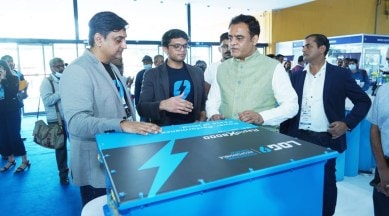Stay updated with the latest - Click here to follow us on Instagram
EV batteries should be locally manufactured keeping in mind India’s weather conditions, say industry experts
Notably, Log9 Materials unveiled India’s first indigenously-developed cell manufacturing facility in Bengaluru in April. The state-of-the-art cell manufacturing facility built by Log9 is touted to be South East Asia’s largest cell production line.

The Union government’s recent approval of the Production Linked Incentive (PLI) scheme — National Programme on Advanced Chemistry Cell (ACC) Battery Storage — will encourage more local production of battery cells, said industry experts.
Speaking with the indianexpress.com, Dr Akshay Singhal, the founder and CEO of Log9 Materials (a Bengaluru-based advanced battery-technology and deep-technology startup), said: “Presently, a lot of the cells and batteries used in India’s electric vehicles are being imported from other countries. These cells are never designed for the Indian operating conditions and, therefore, recently we have seen… two-wheeler EV catching fire. It is very important to make cells here. It should not just be about replicating technology from outside but developing technology specifically made for Indian conditions which include temperature, and the types of vehicles used here.”
monthly limit of free stories.
with an Express account.
Talking about the ramifications of borrowing technology from outside, he said: “Most of the battery innovation has happened in the temperate belt. They have developed the technologies for the requirement existing in Korea, China, US, UK and these countries do not see the kind of temperature profile we see in India, so mindlessly bringing the technology… will not work here. It will lead to safety issues and beyond it, we will also have cost and performance issues.”
Notably, Log9 Materials unveiled India’s first indigenously-developed cell manufacturing facility in Bengaluru in April. The state-of-the-art cell manufacturing facility built by Log9 is touted to be South East Asia’s largest cell production line.
Sharing his views on the Karnataka government’s decision to conduct EV expos in Tier-II and Tier-III cities, Singhal said: “Tier-II and Tier-III cities are catching up in using EVs. If we look at the two-wheeler EV industry… In Karnataka, Coorg and Chikkamagaluru people are using electric two-wheelers left, right and centre. High fuel prices are also driving people to EV adoption.”
He also welcomed the GST Council’s decision to tax EVs with or without the battery pack at 5 per cent. Earlier, e-vehicles were taxed at 5 per cent while the lithium-ion batteries were taxed at 18 per cent.
At the Green Vehicle Expo-2022 held from July 1-3, Log9 Materials unveiled a new range of electric vehicles for last-mile logistics across different EV platforms – including two-wheelers, three-wheelers and four-wheelers – all of which are InstaCharged by its RapidX batteries.
In the e-2W segment, the start-up showcased the all-new Quanta e-bike made by Gravton Motors, which holds the distinction of travelling from Kanyakumari to Khardung La successfully. It also boasts of being an all-terrain bike, which is a first in its segment. In the e-3W segment, the company displayed Rage+ RapidEV, a model currently existing in the market, which can go from 0 to 100 per cent charge in 35 minutes.
Another e-3W cargo vehicle Grevol – which is India’s first electric three-wheeler with a load carrying capacity of more than electric 4Ws — was unveiled. Log9 in collaboration with eBikeGo launched an electric trike called Velocipedo. In the e-4W segment, in collaboration with Northway Motors, it unveiled a retrofitted Light Commercial Vehicle (LCV), which is claimed to be the fastest-charging four-wheeler commercial retrofitted vehicle.
Singhal said, “The overall EV adoption in India today stands at 0.8 per cent; but the country has set goals to achieve 30 per cent EV adoption in the B2C sector and over 70 per cent adoption in the B2B segment by 2030. To achieve such ambitious goals, India needs to accelerate EV adoption through technologies made for India, and… impetus on B2B electrification should be the go-to route to take…”